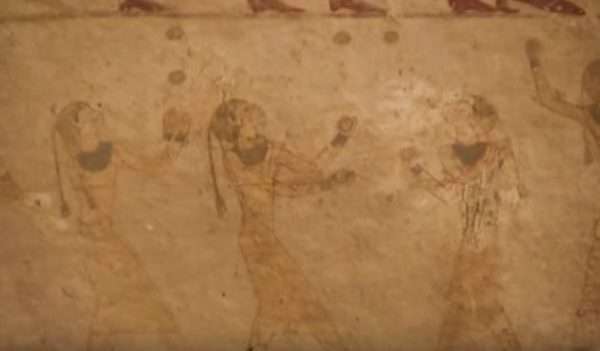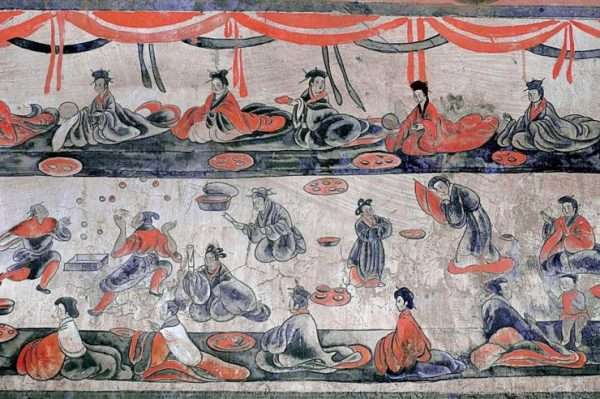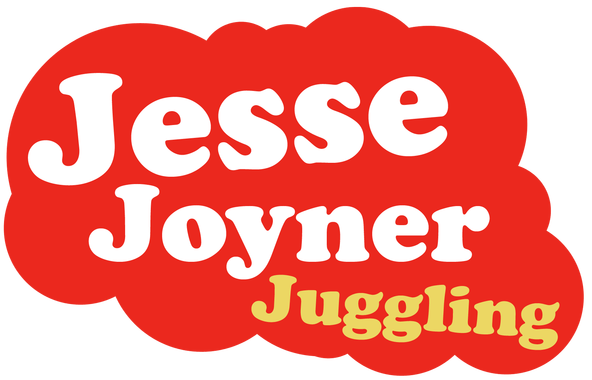Juggling is really old.
Did you know that images of jugglers have been discovered on the walls of an ancient Egyptian tomb that is about 4,000 years old? Near the town of modern-day Minya, Egypt, you can visit the Beni Hasan tombs. In tomb number 15, you can see an unmistakable illustration of multiple women juggling balls or rocks of some sort (some to themselves and some with one another). Researcher Billy Gillen believes the juggling had some sort of religious funerary significance to it – like an offering of performance art made on behalf of the deceased (Juggler’s World, Vol. 38, No. 2). The first image is a darkening of the drawing. The second image is a still shot of a video someone took inside the actual tomb.


Other depictions of juggling throughout history have been discovered as well, like this illustration of a juggler on a tomb wall in China that is nearly 2,000 years old (Dahuting Tomb, Eastern Han Dynasty, 25-220 CE, Zhengzhou, Henan province, China):

You can actually see the newly acquired skill of juggling show up as grey matter in a brain scan!
In 2004, a group of scholars published an article in the journal Nature that described how they found new areas of grey matter on brain scans of people who had recently learned how to juggle. Basically, they did brain scans on a group of people. They then split the group into two parts and taught one part of the group how to juggle over a three-month period. The people who learned how to juggle then showed new grey matter in a particular part of the brain while the non-jugglers showed no new grey matter. Furthermore, the new jugglers intentionally let their new skill fade away for the study. They stopped practicing for three months. A final scan was done at that point and the grey matter had faded into a smaller size of grey matter!
This means that when it comes to our brains, if we don’t use it, we literally lose it (that is, the muscle memory we had built up when originally learning something). It also shows what is called the neuro-plasticity of our brains. Our brains can grow and learn new things throughout our entire lives (and conversely lose things that we stop working on). Contrary to popular belief, you can teach an old dog new tricks.
Here is the reference for the article: Bogdan Draganski, Christian Gaser, Volker Busch, Gerhard Schuierer, Ulrich Bogdahn & Arne May. “Neuroplasticity: Changes in grey matter induced by training.” Nature 427, 311-312 (22 January 2004).
Juggling is a powerful force of art.
Pretty much all art has the power to communicate messages in remarkable ways. I have found that the art of juggling is no exception. This does not mean we should necessarily “exploit” art for the purpose of communication. Often, art stands on its own as great art with no intended message. But if I want to teach children about the solar system, character development, gravity, or about loving one’s neighbor, I have found that juggling will not only hold their attention for the message, but it also helps them visualize a point and even retain it for a long period of time.
Let me give an example: One of my first shows when I was just starting out was a Parent’s Night Out event at a church in Marion, Indiana (Hanfield United Methodist Church). I was a young college student at Taylor University just down the road. I was responsible for entertaining of room of about 30 or 40 kids on Valentine’s Day evening while their parents went out on a date. I performed my show, the kids loved it, the parents came back, and everyone went home happy.
So happy, in fact, that the event organizer invited me back the following year for the same event on Valentine’s Day. I was still young and new at performing, so this was my first repeat customer. I figured it had been an entire year since my last show, so there would be no problem performing the same routine…right?
I was wrong. I started my show that second year and noticed that many of the same kids from the previous year were in the crowd. How did I know? They started feeding me the lines of my stories and jokes before the words came out of my mouth! They had remembered my words A YEAR LATER. I was dumbfounded. What if kids could retain everything they learn in school and church the same way?
I realized two truths while performing that show: Number one, juggling is a powerful tool for teaching as it somehow causes children to remember whatever you’re saying with the show with amazing precision. Number two, I needed to work on some new material!
So I often present some sort of story or message along with my show. It might be a Biblical story for a faith-based group or a topic related to hard work and character development for a school assembly. I also perform shows that are strictly entertainment. Those are fun too, because we all know that sometimes, the best thing to do is just relax and laugh without a particular message or agenda being presented.
Which brings me to my final story: I once was asked to perform for a group of mostly Arab children in the Palestinian city of Bethlehem at one of the schools there. The year was 2000, and I was a study-abroad student that semester at Jerusalem University College. What became known as The Second Intafada flared up while I was there. It was a period of intense fighting between the Israeli army and Palestinian fighters.
My host was one of the school’s administrators and showed me around a village that had been destroyed by the fighting the night before I came. These children lived and saw war all around them. I humbly stood before them and performed my juggling show. They laughed and had a great time. So did I.
After the show, my host came up to me and said, “Thank you so much, Jesse. This is exactly what these kids needed. When they go outside for recess, they play funeral. They line up in a procession and pretend to carry a coffin and march through the playground. What you did today made them laugh and brought smiles to their faces. Thank you.”
Play funeral?! Wow. And here I am, just a silly juggler from another country doing something that I enjoy doing. I didn’t have all the answers to their troubles and I certainly don’t have all the answers to war. But the little bit that I did by doing a juggling show somehow helped, even if just in a small way. The small things we do (whether juggling or something else) can be more powerful than we ever know.
Do you juggle? If so, what are some surprising things you’ve learned about juggling in your life? If you don’t juggle, what are some surprising things you’ve learned about life from your interests, hobbies, and work?




2 responses to “Three Surprising Things I’ve Learned from Juggling”
This is great, Jesse 🙂
Thanks Joseph! Great to hear from you. -Jesse